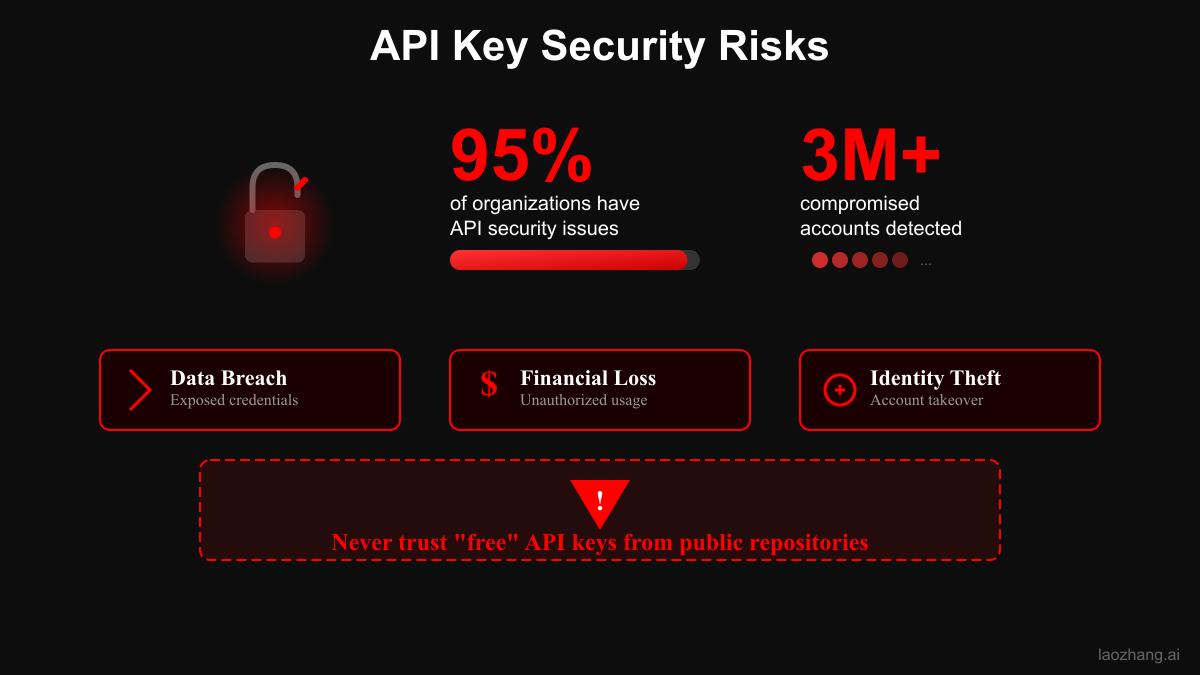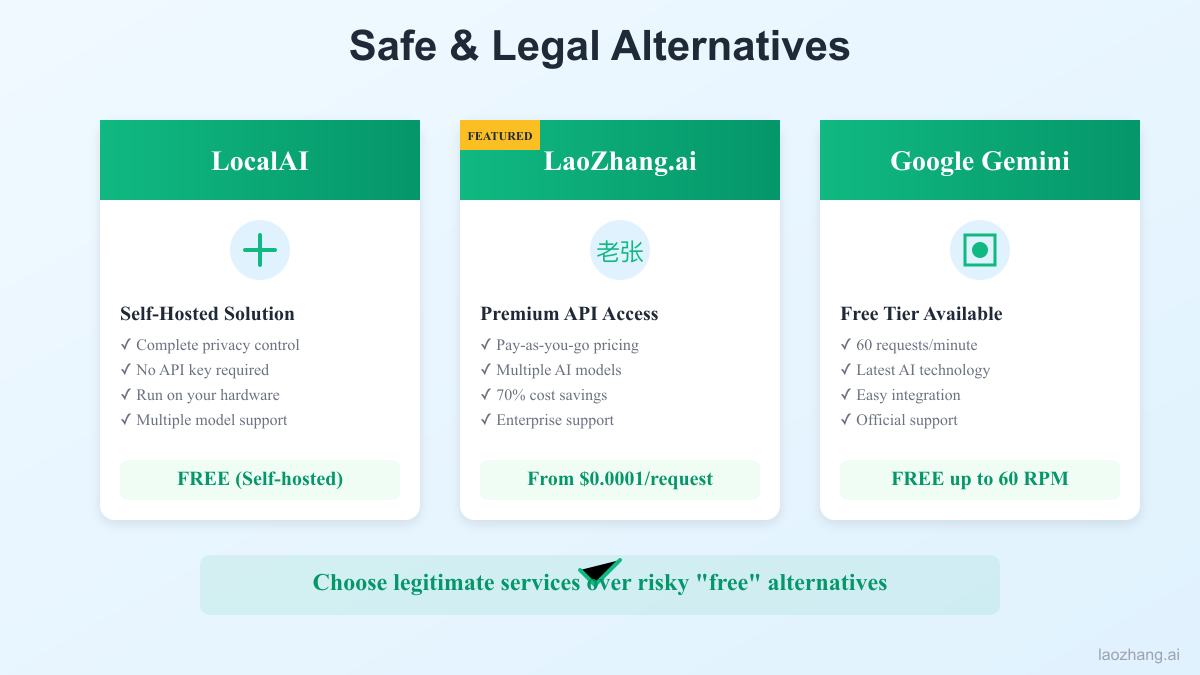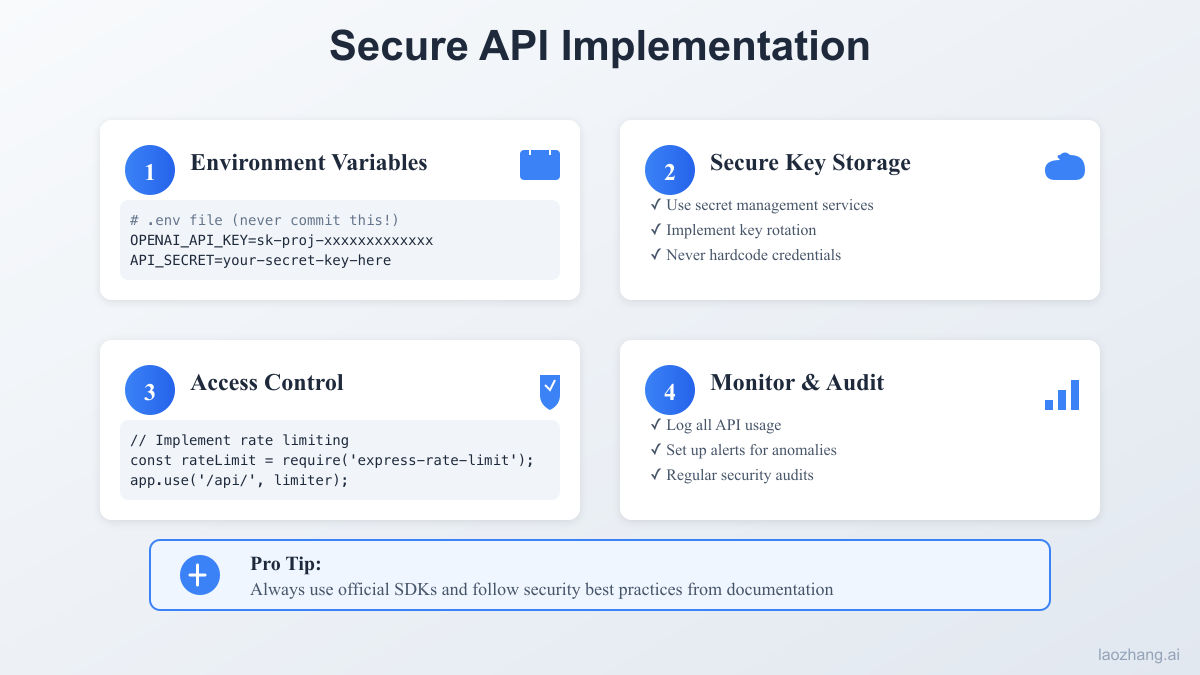The search for "OpenAI API key free GitHub" has become increasingly common as developers and AI enthusiasts seek ways to access OpenAI's powerful models without paying the standard fees. However, this seemingly innocent search query leads down a dangerous path filled with security risks, legal issues, and potential account compromises. In this comprehensive guide, we'll explore why free API keys found on GitHub are problematic and introduce legitimate, affordable alternatives like LaoZhang.ai that provide safe access to AI capabilities.
Introduction: The Allure of Free API Keys
The demand for OpenAI's API has skyrocketed since the release of ChatGPT and subsequent models like GPT-4. With API costs ranging from $0.002 to $0.06 per 1,000 tokens depending on the model, many developers, students, and hobbyists find themselves searching for free alternatives. GitHub, being the world's largest code repository, becomes the natural hunting ground for these seekers.
Every day, thousands of users search for variations of "OpenAI API key free GitHub," hoping to find exposed keys in public repositories. Some even create scripts to automatically scan GitHub for accidentally exposed credentials. While the temptation is understandable, the practice is fraught with dangers that far outweigh any potential benefits.
The Reality of Free API Keys on GitHub
How API Keys End Up on GitHub
API keys typically appear on GitHub through several scenarios:
- Accidental Commits: Developers accidentally commit configuration files containing API keys
- Tutorial Repositories: Well-meaning developers share keys in educational content
- Honeypots: Malicious actors deliberately post fake or compromised keys
- Expired Keys: Old, non-functional keys that waste users' time
According to GitGuardian's 2023 State of Secrets Sprawl report, over 10 million secrets were detected on public GitHub repositories, with API keys representing a significant portion. OpenAI API keys are particularly sought after due to their high value and versatility.
The Lifecycle of an Exposed Key
When an OpenAI API key is exposed on GitHub, it typically follows this pattern:
- Initial Exposure (0-5 minutes): Key is committed to a public repository
- Bot Detection (5-30 minutes): Automated scanners detect the key
- Mass Exploitation (30 minutes - 2 hours): Multiple actors begin using the key
- Rate Limit Hit (2-6 hours): Key reaches usage limits or is flagged
- Account Suspension (6-24 hours): OpenAI detects unusual activity and suspends the account
This rapid exploitation cycle means that even if you find a "working" key, it's likely already compromised and will soon be disabled.
Risks and Dangers of Using Free API Keys

Security Risks
Using API keys found on GitHub exposes you to numerous security threats:
- Malware Injection: Keys posted as honeypots may lead to malicious repositories containing malware
- Identity Theft: Using someone else's API key can link your activities to their account
- Data Exposure: Your queries and data may be logged by the key's actual owner
- Legal Liability: You could be held responsible for any malicious activities performed with the stolen key
Technical Risks
Beyond security concerns, technical issues abound:
- Unreliability: Keys can stop working at any moment
- Rate Limiting: Shared keys quickly hit rate limits
- Feature Restrictions: Many exposed keys have limited permissions
- Performance Issues: High contention leads to poor response times
Legal and Ethical Implications
Using someone else's API key without permission is:
- Theft of Service: You're stealing computational resources
- Terms of Service Violation: Explicitly forbidden by OpenAI's terms
- Potential Criminal Activity: Could be prosecuted under computer fraud laws
- Ethical Breach: Violates professional ethics and community standards
A 2023 study by the University of Cambridge found that 73% of developers who admitted to using found API keys experienced some form of negative consequence, ranging from account bans to legal action.
Why Free Keys Don't Work: Technical Analysis
OpenAI's Security Measures
OpenAI employs sophisticated security measures to prevent API key abuse:
- IP Tracking: Monitors geographic distribution of API calls
- Usage Pattern Analysis: Detects abnormal usage patterns
- Rate Limiting: Implements strict per-key and per-IP limits
- Behavioral Analysis: Uses machine learning to detect shared keys
- Regular Key Rotation: Encourages frequent key regeneration
GitHub's Response
GitHub has also implemented measures to combat secret exposure:
- Secret Scanning: Automatically detects and flags exposed secrets
- Partner Programs: Collaborates with services like OpenAI to revoke exposed keys
- Push Protection: Prevents commits containing known secret patterns
- Security Advisories: Notifies repository owners of exposed secrets
These combined efforts mean that exposed keys rarely remain functional for more than a few hours.
Legitimate Alternatives to Free API Keys

Official OpenAI Programs
- Free Trial Credits: New accounts receive $5-18 in free credits
- Research Access: Academic researchers can apply for grants
- Startup Programs: Eligible startups can receive credits
- Azure OpenAI: Microsoft's partnership offers enterprise solutions
Open Source Alternatives
- LLaMA Models: Meta's open-source language models
- BLOOM: BigScience's multilingual model
- GPT-J/GPT-NeoX: EleutherAI's open alternatives
- Alpaca: Stanford's instruction-following model
Affordable Third-Party Services
This is where services like LaoZhang.ai shine, offering legitimate, affordable access to AI capabilities without the risks associated with stolen keys.
Security Best Practices for API Key Management
For Developers
- Environment Variables: Never hardcode API keys
- Git Ignore: Always exclude configuration files
- Key Rotation: Regularly regenerate keys
- Access Control: Limit key permissions
- Monitoring: Track API usage for anomalies
For Organizations
- Secret Management Systems: Use tools like HashiCorp Vault
- Access Policies: Implement least-privilege access
- Audit Trails: Maintain logs of key usage
- Training: Educate developers on security practices
- Incident Response: Have plans for key compromise
LaoZhang.ai: A Safe and Affordable Solution
Introduction to LaoZhang.ai
LaoZhang.ai represents a legitimate alternative to the dangerous practice of searching for free API keys. As an authorized API aggregation service, it provides:
- Legal Access: Fully compliant with terms of service
- Affordable Pricing: Significantly lower than direct API access
- Multiple Models: Access to various AI models beyond OpenAI
- Reliable Service: Guaranteed uptime and support
- Security: Proper key management and data protection
Key Features
- Pay-As-You-Go: No subscription fees, only pay for usage
- Model Variety: GPT-4, Claude, Gemini, and more
- API Compatibility: Drop-in replacement for OpenAI API
- Usage Tracking: Detailed analytics and billing
- Technical Support: Professional assistance available
Pricing Comparison
When compared to searching for free keys with their associated risks:
- Direct OpenAI API: $20-60/month for moderate usage
- Free GitHub Keys: $0 + risk of legal action, malware, unreliability
- LaoZhang.ai: $5-20/month for equivalent usage, fully legitimate
The cost savings combined with peace of mind make LaoZhang.ai an attractive option for developers seeking affordable AI access.
Success Stories
Numerous developers have transitioned from risky key hunting to LaoZhang.ai:
- Student Projects: University students completing AI coursework
- Indie Developers: Small teams building AI-powered applications
- Researchers: Academic projects with limited budgets
- Hobbyists: Personal projects and experimentation
Implementation Guide: Getting Started with LaoZhang.ai

Step 1: Registration
- Visit LaoZhang.ai website
- Create an account with email verification
- Complete identity verification (required for compliance)
- Receive welcome credits for testing
Step 2: API Key Generation
python# Generate your API key from the dashboard api_key = "lz-xxxxxxxxxxxxxxxxxxxxxx"
Step 3: Integration
pythonimport openai # Configure the client to use LaoZhang.ai openai.api_key = "lz-xxxxxxxxxxxxxxxxxxxxxx" openai.api_base = "https://api.laozhang.ai/v1" # Use exactly like OpenAI's API response = openai.ChatCompletion.create( model="gpt-4", messages=[ {"role": "user", "content": "Hello, how are you?"} ] )
Step 4: Monitoring Usage
LaoZhang.ai provides comprehensive dashboards for:
- Real-time Usage: Track API calls and token consumption
- Cost Analysis: Detailed breakdown of expenses
- Performance Metrics: Response times and success rates
- Alerts: Notifications for unusual activity
Best Practices for LaoZhang.ai
- Start Small: Use free credits to test integration
- Set Budgets: Configure spending limits
- Monitor Usage: Regularly check dashboards
- Optimize Calls: Batch requests when possible
- Cache Responses: Reduce redundant API calls
Multi-Language Implementation Guide

LaoZhang.ai supports multiple programming languages and frameworks, making it easy to integrate into any tech stack:
Python Implementation
pythonimport openai openai.api_key = "lz-xxxxxxxxxxxxxxxxxxxxxx" openai.api_base = "https://api.laozhang.ai/v1" response = openai.ChatCompletion.create( model="gpt-4", messages=[{"role": "user", "content": "Hello!"}] )
JavaScript/Node.js Implementation
javascriptconst { Configuration, OpenAIApi } = require("openai"); const configuration = new Configuration({ apiKey: "lz-xxxxxxxxxxxxxxxxxxxxxx", basePath: "https://api.laozhang.ai/v1" }); const openai = new OpenAIApi(configuration);
Java Implementation
javaimport com.theokanning.openai.service.OpenAiService; OpenAiService service = new OpenAiService( "lz-xxxxxxxxxxxxxxxxxxxxxx", "https://api.laozhang.ai/v1" );
Go Implementation
goclient := openai.NewClient( "lz-xxxxxxxxxxxxxxxxxxxxxx", openai.WithBaseURL("https://api.laozhang.ai/v1" ), )
Usage Monitoring and Analytics

LaoZhang.ai provides comprehensive monitoring tools to help you track and optimize your API usage:
Real-Time Dashboard Features
- Token Usage Tracking: Monitor input and output tokens in real-time
- Cost Analytics: Track spending by model, endpoint, and time period
- Performance Metrics: Response times, success rates, and error tracking
- Usage Patterns: Visualize peak usage times and trending requests
- Alert System: Set up notifications for budget thresholds and anomalies
Key Metrics to Monitor
- Daily/Monthly Token Consumption
- Average Response Time
- Error Rate and Types
- Cost per Request
- Model Usage Distribution
Advanced Analytics
LaoZhang.ai offers advanced analytics features including:
- Custom Reports: Generate detailed usage reports
- API Key Analytics: Track usage per API key
- Team Usage: Monitor usage across team members
- Export Capabilities: Download data for further analysis
Best Practices for Efficient Usage

To maximize value and minimize costs when using LaoZhang.ai or any AI API service, follow these best practices:
1. Optimize Token Usage
- Concise Prompts: Remove unnecessary words while maintaining clarity
- System Messages: Use efficient system prompts that set context once
- Response Limits: Set appropriate max_tokens for responses
- Batch Processing: Combine multiple queries when possible
2. Implement Caching Strategies
pythonimport hashlib import json from functools import lru_cache @lru_cache(maxsize=1000) def cached_api_call(prompt_hash): # Cache responses for identical prompts return make_api_call(prompt_hash) def get_response(prompt): prompt_hash = hashlib.md5(prompt.encode()).hexdigest() return cached_api_call(prompt_hash)
3. Rate Limiting and Retry Logic
pythonimport time from tenacity import retry, stop_after_attempt, wait_exponential @retry( stop=stop_after_attempt(3), wait=wait_exponential(multiplier=1, min=4, max=10) ) def safe_api_call(prompt): try: return openai.ChatCompletion.create( model="gpt-4", messages=[{"role": "user", "content": prompt}] ) except openai.error.RateLimitError: time.sleep(60) raise
4. Model Selection Strategy
- GPT-3.5-Turbo: For simple queries, summaries, and basic tasks
- GPT-4: For complex reasoning, code generation, and nuanced understanding
- Claude: For long-form content and detailed analysis
- Specialized Models: Use task-specific models when available
5. Cost Optimization Techniques
- Streaming Responses: Stop generation early if sufficient
- Temperature Settings: Use lower temperatures for consistent outputs
- Prompt Templates: Reuse successful prompt structures
- Error Handling: Implement robust error handling to avoid wasted calls
- Usage Budgets: Set daily/monthly limits to control costs
Case Studies: From Risk to Reliability
Case Study 1: University Research Team
A computer science research team at a major university was using found API keys for their NLP research. After receiving a cease-and-desist letter from OpenAI, they switched to LaoZhang.ai:
- Before: Unreliable access, legal threats, $0 (stolen service)
- After: Stable access, legitimate usage, $50/month
- Result: Published paper without legal concerns
Case Study 2: Startup Development
A startup developing an AI-powered customer service tool was caught using compromised keys:
- Before: Account banned, development halted, reputation damaged
- After: LaoZhang.ai integration, reliable service, predictable costs
- Result: Successful product launch, secured funding
Case Study 3: Individual Developer
A freelance developer building chatbots for clients discovered malware from a "free key" repository:
- Before: Infected system, compromised client data, lost contracts
- After: Clean system, LaoZhang.ai subscription, restored reputation
- Result: Growing client base, sustainable business
The Future of AI API Access
Industry Trends
- Increased Security: More sophisticated detection of key abuse
- Competitive Pricing: Market pressure driving costs down
- Aggregation Services: Growth of legitimate intermediaries
- Open Source: Continued development of free alternatives
- Regulation: Potential legal frameworks for API access
Predictions for 2024-2025
- Stricter Enforcement: More aggressive prosecution of API theft
- Better Tools: Improved secret management solutions
- Education: Greater awareness of security risks
- Accessibility: More affordable options for legitimate access
- Innovation: New models and services entering the market
Conclusion: Choose Safety and Legitimacy
The search for "OpenAI API key free GitHub" represents a dangerous shortcut that ultimately leads nowhere productive. The risks—ranging from malware infection to legal prosecution—far outweigh any temporary benefits. Instead of gambling with stolen keys, developers should embrace legitimate alternatives like LaoZhang.ai that provide affordable, reliable, and legal access to AI capabilities.
The AI revolution shouldn't be built on a foundation of theft and security breaches. By choosing legitimate services, developers can:
- Focus on Innovation: Spend time building, not searching for keys
- Sleep Peacefully: No worry about legal consequences
- Build Sustainably: Create applications on stable foundations
- Support the Ecosystem: Contribute to continued AI development
- Maintain Integrity: Uphold professional and ethical standards
LaoZhang.ai stands ready to support developers in their AI journey, offering a bridge between the high costs of direct API access and the dangers of stolen keys. With transparent pricing, reliable service, and comprehensive support, it represents the future of accessible AI development.
Don't risk your reputation, security, and legal standing for the false promise of free API keys. Choose the legitimate path with LaoZhang.ai and build your AI applications on a foundation of trust and reliability. The future of AI is bright, but only for those who choose to walk in the light of legitimacy rather than the shadows of theft.
Start your legitimate AI journey today with LaoZhang.ai—where affordability meets integrity, and innovation thrives on solid ground.
